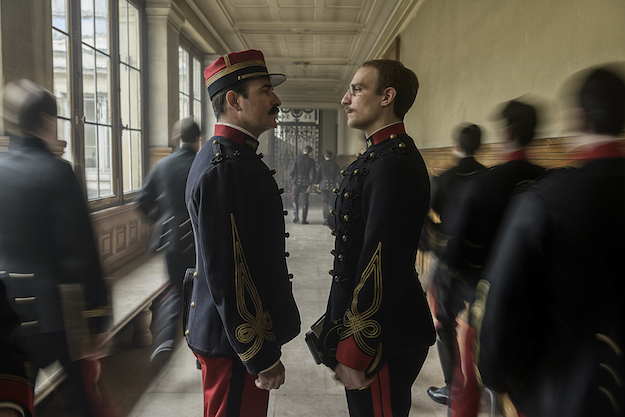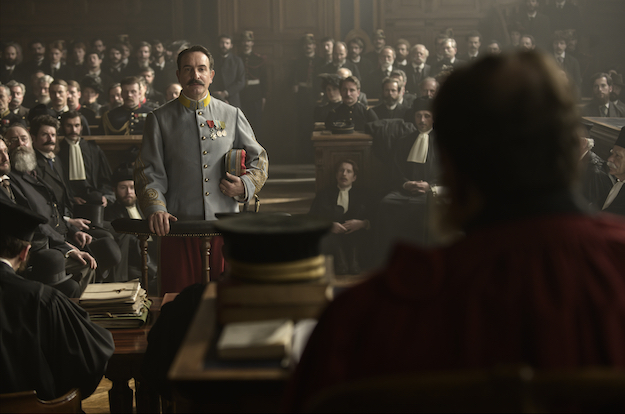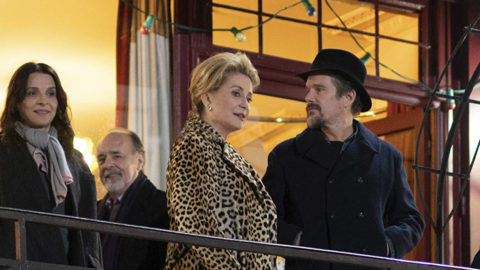Film of the Week: An Officer and a Spy

Not everyone is happy about Roman Polanski having a new film in competition in Venice—especially since the festival only has two women directors competing this year. Some commentators have considered it an act of some chutzpah for Polanski to make a film about a historic case of unjust accusation and punishment—J’Accuse (aka An Officer and a Spy), his account of the Dreyfus case which divided France in the 1890s. In reality, it would be seriously stretching a point to interpret Polanski’s new film as being in any direct way about his own experience, although his depiction of Dreyfus’s exile on Devil’s Island certainly rhymes with his concern with the pain of isolation, from The Tenant to The Pianist.
Not that Polanski has distanced himself entirely from this topic in public statements. In the interview published in the film’s press notes, philosopher Pascal Bruckner asks the director whether he will survive the “present day neo-feminist McCarthyism”—to which Polanski replies: “In the story, I sometimes find moments I have experienced myself, I can see the same determination to deny the facts and condemn me for things I have not done.” Making this sort of parallel, especially in as profane a context as a PR kit, may not help Polanski’s cause greatly at a time when, outside France and the European circuit that honors grands auteurs, his reputation as a public figure is arguably at its lowest ebb. It looks especially awkward when promoting a film that, from most angles, looks very much like an impersonal study of a historic case (just as Polanski’s films have tended to feel impersonal and detached for quite some time, even when the subject is as directly connected to his personal history as the Holocaust story The Pianist).
One of the routine defenses of Polanski is to claim that, whatever he may have done in his personal life, he remains indisputably a great filmmaker, which some see as an inarguable defense. As Venice artistic director Alberto Barbera put it at the opening press conference: “He is, in my opinion, one of the last masters in European cinema.” In today’s climate, the “mastery defense” has come under increasing scrutiny, and in any case, this has been a very tenuous case to make for Polanski for some time: he has certainly made some very good films over the years, but it’s debatable whether there has been anything of outstanding brilliance and originality since Chinatown and The Tenant in the mid-’70s (apart, perhaps, for the outstandingly bold and contentious oddity of 1992’s much-derided sexual-politics black comedy Bitter Moon).
An Officer and a Spy will not persuade skeptics that Polanski is that lofty and dubious thing, a True Master. But it is a very solid, compelling, and serious piece of filmmaking. Based on the novelized version of the case by Robert Harris (who has adapted the book alongside Polanski), this account of the story is original in not following the ordeal of French artillery officer Alfred Dreyfus (a barely recognizable Louis Garrel), seen at the start of the film undergoing court martial in 1894 on charges of treason and supplying information to the Germans. Instead, the film follows another officer, Georges Picquart (Jean Dujardin), who, after being promoted to the head of the French army’s intelligence bureau, discovers through following a completely different case that there is a crucial anomaly in the supposedly cast-iron evidence against Dreyfus. Picquart realizes that the man has been falsely charged, the scapegoated victim of the virulent anti-Semitism that, the film shows, was very prevalent in France at that time.
The film is a detective/espionage story, with an emphasis on military political intrigue and bureaucratic conspiracy, suggestive of French fin de siècle John le Carré. What makes the drama gripping and plausible from the start is the fact that Picquart is not a noble idealist and whistleblowing rebel, but simply a career soldier of integrity who believes in truth and justice and believes it is his duty to pursue their cause. In fact, he is shown at the start to be less than saintly himself, pursuing secret assignations with the married wife (Emmanuelle Seigner) of a friend, and himself casually subscribing to the anti-Semitism universal in his milieu. It is perhaps frustrating that the scant depiction of Dreyfus’s ordeal—partly shown in brief sepia sequences, with Garrel’s voiceover reading of his letters—marginalizes the man at the center of this story. But then, it might have come across as intrusive to show us too much of his exile, and what is essential to the film is the way that Dreyfus has been excluded from his own life, exiled and silenced—a pariah on an island far from his own world.

For the first 20 minutes or so, Polanski’s film threatens to be a solemn, laborious and altogether academic affair—a corridors-of-power drama in which the parquet floors of those corridors are sheened with pedantic historical accuracy. As the film develops, however, two things impress. One is the visual precision with which Polanski, DP Pawel Edelman, and production designer Jean Rabasse recreate Paris at this period—one brief scene at a café-concert feels more authentically a cinematic evocation of the world of Lautrec and Manet than anything comparable I’ve seen in French or any other cinema. There’s a certain visual mannerism that irks for the first part of the film—the tendency to show interiors cloaked in dusty half-light, a very tangible metaphor for the fog of untruth. But it adds to the impression that this is a profoundly anti-glamorizing depiction of the past—a Belle Époque that is anything but beau.
The other is the narrative concentration and seriousness of Polanski’s approach, which has no space for thrills or distractions, but simply shows Picquart pursuing the case doggedly as he cleans up the shady mess that Intelligence headquarters has become. Dujardin’s singularly not-of-our-era physiognomy and ever so slightly stiff bearing make him perfect for the part, which he plays with due solemnity and an utmost lack of self-promotion. The casting is perfect throughout—every face fitting the period perfectly, without its ever seeming that Polanski has trawled for memorable (read: folkloric) “characters.” The credits are liberally stacked with Comédie Française notables (including Michel Vuillermoz and Denis Podalydès) alongside French cinema axioms such as Mathieu Amalric and Melvil Poupaud, but grandstanding is minimal. The performance that most imposes itself in a larger, more theatrical way is by Grégory Gadebois as Picquart’s resentful subordinate turned foe, Major Henry, a masterful portrayal of institutionalized laziness, prejudice, and corruption.
One of the most shocking moments in the film comes early on, in the form of a crowd baying for Dreyfus’s blood; another comes later, after the novelist Émile Zola has written his famous open letter “J’Accuse” in the newspaper L’Aurore, and crowds burn the author’s books and paint anti-Semitic graffiti on shop windows (here’s something Polanski does know about from his early experience). Depictions of anti-Semitism are something that, alas, never become out of date, and these feel particularly discomforting today. The other thing that feels especially timely is the film’s defense of a free press and independent campaigning investigative journalism. Whatever misgivings you have about the state of Polanski’s artistry or about his right to continue to be adulated or, many would argue, be let off the moral hook, this is certainly a film that powerfully expounds a righteous moral message—regardless whether you consider Polanski himself to be an arbiter of righteousness or morality. In any case, this film is in no sense groundbreaking auteur cinema—not the ineffable sui generis stuff we tend hopefully to associate with “Masters,” but it is a very fine, very authoritative drama, and well worth seeing. But Polanski does lose points for one touch of vanity—this member of France’s Académie de Beaux-Arts appears as an extra in a salon scene, wearing the full regalia of an académicien.
Jonathan Romney is a contributing editor to Film Comment and writes its Film of the Week column. He is a member of the London Film Critics Circle.




